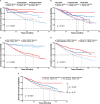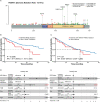Comprehensive characterization of FBXW7 mutational and clinicopathological profiles in human colorectal cancers
- PMID: 37064111
- PMCID: PMC10091464
- DOI: 10.3389/fonc.2023.1154432
Comprehensive characterization of FBXW7 mutational and clinicopathological profiles in human colorectal cancers
Abstract
Background: FBXW7 is recognized as a critical tumor suppressor gene and a component of the ubiquitin-proteasome system, mediating the degradation of multiple oncogenic proteins, including c-MYC, Cyclin E, c-Jun, Notch, p53. Around 16% of colorectal cancer (CRC) patients carried FBXW7 somatic mutations, while a comprehensive characterization of FBXW7 somatic mutations in CRC is still lacking.
Methods: Colorectal cancer patients with tumor samples and matching white blood cell samples in the past five years were screened and DNA sequenced. DNA sequencing data of MSK MetTropism cohort and RNA sequencing data of TCGA COAD cohort were analyzed.
Results: We discovered that the FBXW7 mutations were associated with higher tumor mutation burden (TMB), higher microsatellite instability (MSI) score, and lower chromosomal instability (CIN) score. Patients with FBXW7 mutations showed better overall survival (HR: 0.67; 95%CI: 0.55-0.80, P < 0.001). However, patients with FBXW7 R465C mutation displayed worse overall survival in multi-variate cox analysis when compared with patients carrying other FBXW7 mutations (HR: 1.6; 95%CI: 1.13-3.1, P = 0.015), and with all other patients (HR: 1.87; 95%CI: 0.99-2.5, P = 0.053). Moreover, in MSI patients, the FBXW7 mutated group showed higher M1 macrophage, CD8+ T cell, and regulatory T cell (Tregs) infiltration rates, and significant enrichment of multiple immune-related gene sets, including interferon-gamma response, interferon-alpha response, IL6 JAK STAT3 signaling, p53 pathway.
Conclusion: This analysis comprehensively identified FBXW7 alterations in colorectal cancer patients and uncovered the molecular, clinicopathological, and immune-related patterns of FBXW7-altered CRC patients.
Keywords: Fbxw7; GSEA analysis; biomarker; colorectal cancer; next generation sequencing - NGS.
Copyright © 2023 Liu, Chen, Bao, Zhang, Wu and Zhu.
Conflict of interest statement
HC, HB and JZ are employees of Nanjing Geneseeq Technology Inc., China. The remaining authors declare that the research was conducted in the absence of any commercial or financial relationships that could be constructed as a potential conflict of interest.
Figures





Similar articles
-
Clinicopathologic characteristics of FBXW7-mutated colorectal adenocarcinoma and association with aberrant beta-catenin localization.Hum Pathol. 2022 Jan;119:51-58. doi: 10.1016/j.humpath.2021.10.003. Epub 2021 Oct 27. Hum Pathol. 2022. PMID: 34717891
-
A next-generation sequencing-based strategy combining microsatellite instability and tumor mutation burden for comprehensive molecular diagnosis of advanced colorectal cancer.BMC Cancer. 2021 Mar 16;21(1):282. doi: 10.1186/s12885-021-07942-1. BMC Cancer. 2021. PMID: 33726687 Free PMC article.
-
FBXW7: a critical tumor suppressor of human cancers.Mol Cancer. 2018 Aug 7;17(1):115. doi: 10.1186/s12943-018-0857-2. Mol Cancer. 2018. PMID: 30086763 Free PMC article. Review.
-
FBXW7 mutation analysis and its correlation with clinicopathological features and prognosis in colorectal cancer patients.Int J Biol Markers. 2015 Feb 24;30(1):e88-95. doi: 10.5301/jbm.5000125. Int J Biol Markers. 2015. PMID: 25450649
-
The FBXW7-NOTCH interactome: A ubiquitin proteasomal system-induced crosstalk modulating oncogenic transformation in human tissues.Cancer Rep (Hoboken). 2021 Aug;4(4):e1369. doi: 10.1002/cnr2.1369. Epub 2021 Apr 6. Cancer Rep (Hoboken). 2021. PMID: 33822486 Free PMC article. Review.
Cited by
-
Stromal localization of inactive CD8+ T cells in metastatic mismatch repair deficient colorectal cancer.Br J Cancer. 2024 Feb;130(2):213-223. doi: 10.1038/s41416-023-02500-x. Epub 2023 Dec 2. Br J Cancer. 2024. PMID: 38042958 Free PMC article.
-
Circulating tumour DNA in predicting and monitoring survival of patients with locally advanced rectal cancer undergoing multimodal treatment: long-term results from a prospective multicenter study.EBioMedicine. 2025 Feb;112:105548. doi: 10.1016/j.ebiom.2024.105548. Epub 2025 Jan 15. EBioMedicine. 2025. PMID: 39818166 Free PMC article.
-
Mutational and co-mutational landscape of early onset colorectal cancer.Biomarkers. 2025 Feb;30(1):64-76. doi: 10.1080/1354750X.2024.2447089. Epub 2025 Jan 9. Biomarkers. 2025. PMID: 39761813
-
Utility of comprehensive genomic profiling combined with machine learning for prognostic stratification in stage II/III colorectal cancer after adjuvant chemotherapy.Int J Clin Oncol. 2025 May;30(5):926-934. doi: 10.1007/s10147-025-02722-4. Epub 2025 Mar 17. Int J Clin Oncol. 2025. PMID: 40095334
-
Dysbiosis and colorectal cancer: conducive factors, biological and molecular role, and therapeutic prospectives.Explor Target Antitumor Ther. 2025 Jun 27;6:1002329. doi: 10.37349/etat.2025.1002329. eCollection 2025. Explor Target Antitumor Ther. 2025. PMID: 40585846 Free PMC article. Review.
References
LinkOut - more resources
Full Text Sources
Research Materials
Miscellaneous

